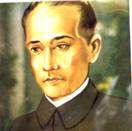Simon Casie Chetty
| Mudaliyar Simon Casie Chetty MLC CCS | |
|---|---|
| சைமன் காசிச் செட்டி | |
 | |
| Unofficial Member (Tamil), Legislative Council of Ceylon | |
|
In office 1838–1845 | |
| Preceded by | A. Coomaraswamy |
| Succeeded by | V. Edirmannasingham |
| Personal details | |
| Born |
21 March 1807 Kalpity, Ceylon |
| Died |
5 November 1860 (aged 53) Kalpity, Ceylon |
| Occupation | Civil servant |
| Ethnicity | Ceylon Chetty |
Simon Casie Chetty (Tamil: சைமன் காசிச் செட்டி, translit. Caimaṉ Kācic Ceṭṭi; 21 March 1807 – 5 November 1860) was a Ceylonese civil servant, author and member of the Legislative Council of Ceylon.
Early life and family
Casie Chetty was born on 21 March 1807 in Kalpity in north-western Ceylon.[1][2][3] He was the son of Gabriel Casie Chetty, Mudaliyar of Kalpity, and Marie de Rosairo.[3] He belonged to Ceylon's small Chetty community, descendants of Tamils from Tirunelveli district in India who migrated to Ceylon during Portuguese rule and converted to Catholicism.[2][3] Gabriel's father Adrian converted to Protestantism during Dutch rule and was a member of the Dutch Reformed Church.[3]
Simon Casie Chetty was baptised as an Anglican in Colombo.[3] He was educated at a Tamil school in Kalpity and in Colombo.[3] As well as Tamil, he was proficient in English, Sinhalese, Sanskrit, Hebrew and Arabic.[3] He also had knowledge of Portuguese, Dutch, Latin and Greek.[3]
Casie Chetty married his cousin in 1839.[3] They had two sons (John and Aloysius) and a daughter.
Career
Casie Chetty was appointed appointed interpreter to the magistrates court in Kalpity in 1824, aged 17.[1][3] He was appointed interpreter to the Office of Assistant Collector of Puttalam in 1826 and in 1828 he became collector of Chilaw.[3] Following the death of his father in 1837 he was appointed Mudaliyar and a proctor.[3] He later became Maniagar (British appointed administrative chief) for Puttalam.[2][3]
Following the death of A. Coomaraswamy Casie Chetty was appointed to the Legislative Council of Ceylon in 1838 as the unofficial member representing Tamils.[1][2][3] He resigned after seven years and joined the Ceylon Civil Service, becoming the first Ceylonese civil servant.[1][3][4] He was appointed police magistrate in Kalpity in 1847 and district judge for Chilaw, a position he held until his death.[1][2][3]
Casie Chetty was responsible for the construction of St. Peter's Church in Kalpity in 1839 and paid half the costs himself.[3] He also ran a Tamil school in Kalpity catering for 50 boys.[3] He became a member of the Ceylonese branch of the Royal Asiatic Society when it was established in 1845.[3] He wrote several books and manuscripts, most notably Ceylon Gazetteer (1834), The Tamil Plutarch (1859) and The Castes, Customs, Manners and Literature of the Tamils (1934).[1][2][3]
Casie Chetty died on 5 November 1860 in Kalpity.[3] Prior to his death he had converted to Catholicism.[3] The Sri Lankan government issued a 75 cent stamp in 1989 honouring Casie Chetty.[1][3][5]
References
- 1 2 3 4 5 6 7 Arumugam, S. (1997). Dictionary of Biography of the Tamils of Ceylon (PDF). London, U.K. pp. 30–31.
- 1 2 3 4 5 6 Muttucumaraswamy, V. (1992). Some Eminent Tamils (PDF). Colombo, Sri Lanka: Department of Hindu Religious and Cultural Affairs, Sri Lanka. pp. 1–5.
- 1 2 3 4 5 6 7 8 9 10 11 12 13 14 15 16 17 18 19 20 21 22 23 Manickavasagar, Kasipillai (25 March 2007). "Among the Chetties rose a great Tamil scholar". The Sunday Times. Colombo, Sri Lanka. Retrieved 11 June 2017.
- ↑ Tissera, Shirley Pulle (4 August 2007). "The Colombo Chetties -- II". The Island. Colombo, Sri Lanka. Retrieved 11 June 2017.
- ↑ Sivakumaran, K. S. (30 May 2007). "Who are these Colombo Chetties?". The Island. Colombo, Sri Lanka. Retrieved 11 June 2017.